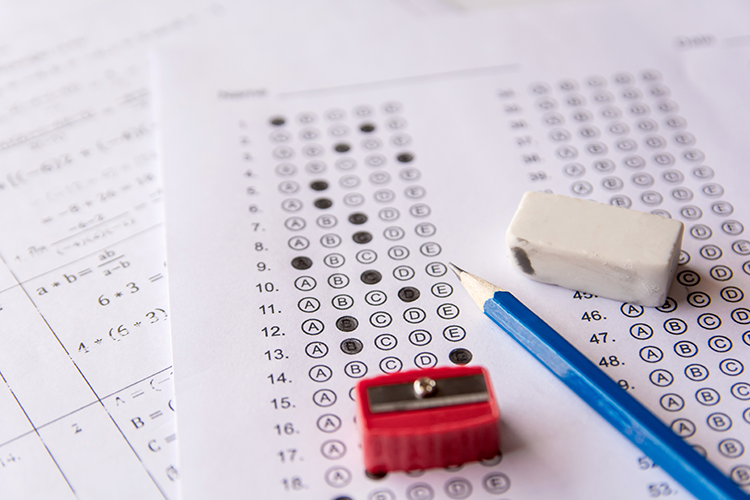Plans for cutting admissions test requirement paused by ABA Legal Ed council

Image from Shutterstock.
After receiving letters from various law school deans with concerns about cutting the Law School Admission Test requirement, the council of the ABA’s Section of Legal Education and Admissions to the Bar on Friday walked back plans to go forward with the proposal in August.
The decision was made Friday—when the council met in Chicago.
A resolution to remove the entrance exam requirement from Standard 503 was rejected by the ABA House of Delegates in February, and less than two weeks later, the council voted to submit the proposal again in August at the the 2023 ABA Annual Meeting.
Many have spoken in favor and against the proposal, but for the most part, all agreed on one thing—that their position would help diversity in legal education.
One letter from law deans, dated April 12, suggested that Standard 503 should be revised to state that law schools admit no more than 25% of an entering class without an entrance exam, rather than cutting the requirement entirely. Additionally, the letter asked that the effectiveness of the revision be evaluated within six years to make sure that the change did not hurt law students and graduates. It was signed by more than 100 law school deans.
An April 13 letter from deans, signed by 14 women of color who lead ABA-accredited law schools, claimed that data does not support the argument that cutting the admissions test requirement will help diversity in the profession.
“At a minimum, this proposal is a bet on an untested strategy—when lesser interventions, such as the compromise proposal, will allow time to understand if this gamble will pay off,” those deans wrote.
The signatories supported the 25% plan detailed in the April 12 letter.
Under ABA rules, proposed revisions to law school accreditation standards and rules are sent to the House of Delegates for concurrence up to two times, but the council has the final decision on matters related to law school education.
Bill Adams, managing director of ABA accreditation and legal education, addressed the issue Friday. According to him, there are possibilities for different policies and practices that might do a better job at determining who can succeed in law school.
Besides Standard 503, he mentioned Standard 501, which focuses on admissions.
“Although the council believes that the proposed amendments to Standards 501 and 503 represent the correct approach to ensure that schools are permitted flexibility to innovate with their admissions policies, it wants to be sensitive and responsive to the concerns raised by law school deans and other stakeholders. The pause announced today will allow the council to evaluate these concerns as it continues to determine what is best for both the law schools and their applicants,” Adams said.
Law schools use the LSAT and the GRE as admissions exams.
“We welcome the council’s decision to explore alternative approaches to help promote access and opportunity in law school admission, and we stand ready to assist the council as they consider alternative policies,” Kellye Testy, president and CEO of the Law School Admission Council, which is responsible for the LSAT, told the ABA Journal in an email.
In other business, the council approved for notice and comment suggested language changes related to standards noncompliance. The proposals were outlined in an April 2023 memo from the section’s strategic review committee.
Suggestions include adding more wording to the definition of “probation” to make clear that it refers to a law school being in jeopardy of having accreditation withdrawn for standards noncompliance.
Also approved by the council were suggested changes to Rule 15, which addresses sanctions, to add language about specific sanctions and their triggers.
“The revision does not narrow the grounds upon which the council may impose sanctions. Rather, the changes eliminate redundancy in the rule,” according to the memo.
Additionally, the council approved proposed revisions aimed at allowing more law school distance education credits. That will likely go to the House of Delegates in August.
The council vote follows notice and comment. A February 2023 memo written by Joseph K. West, the council chair, details the suggested revisions.
The memo suggested allowing up to 50% of a JD program’s credit hours online without ABA approval. Under the existing version of Standard 311, law schools are limited to granting up to one-third of the required credit hours through distance education without council approval.
The U.S. Department of Education only requires accreditor approval if a program offers more than 50% of its credits online, and changing the policy would decrease the amount of substantive change requests that the council receives, according to the memo. It addresses Standards 105, 306, 311 and 511.
Besides language changes to allow up to 50% of a JD program’s credit hours online without ABA approval, the proposed revisions add wording aimed at ensuring quality in distance education. That includes using technology that supports learning outcomes and providing students and faculty training for the technology.
Also, the proposed revisions suggest that if an outside party delivers distance education courses, the law school will actively ensure the quality and effectiveness of the programs. The quality-related proposed revisions relate to Standard 306.
Write a letter to the editor, share a story tip or update, or report an error.


